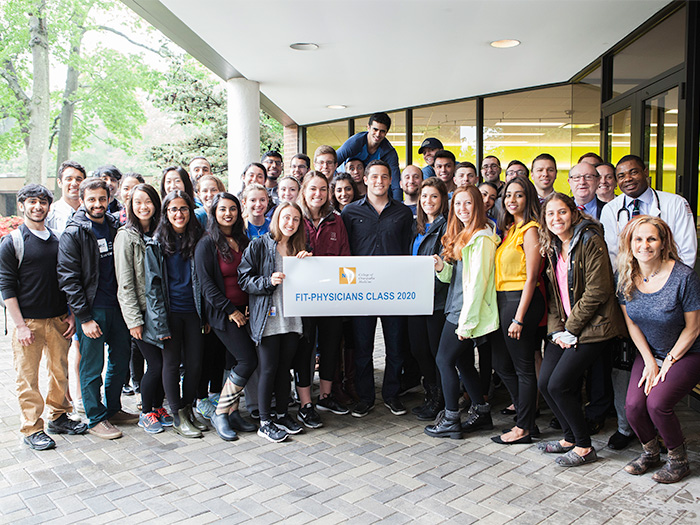News
Stepping it Up: Fit Physician Trial Makes Strides
July 19, 2017
Photo: Associate Professor Joanne Donoghue running with NYITCOM students.
Between taking classes and board exams and intensive studying, medical students may not make time to take care of themselves. Wellness often takes a back seat. To help address this at NYIT, Jerry Balentine, D.O., vice president of medical affairs and global health at NYIT College of Osteopathic Medicine (NYITCOM), decided to take a stand—or rather, a step.
“Wellness is important for physicians,” said Balentine. “How can you heal if you are not well? The best way to emphasize this is by having the vice president take time out of his schedule and have a running/walking event.” Balentine’s run/walk excursions helped break down barriers between students and professors and allowed for open discussions about various topics. “We organized mentored walks and runs, and afterwards students would have discussions about getting through medical school,” said Joanne Donoghue, Ph.D., assistant professor and lead researcher.
The students responded so well to the program that Donoghue and Balentine decided to take the initiative further, not only by encouraging students to get fit and influencing their activity habits, but also by launching a study to examine whether medical students could be taught about wellness through the use of popular technology.
During the 2016-2017 academic year, 124 first-year students at NYITCOM participated in the clinical trial, Fit Physician. The study aimed to prove whether wearing a Fitbit activity tracker alone or combined with an educational program would improve students’ physical activities in their first year of medical school.

124 NYITCOM students participated in the Fit Physician study.
In September 2016, the students, who had their body fat, weight, and lean body mass (muscle) measured at the beginning and end of the study, were broken up into three groups:
- The Fitbit Plus group received a Fitbit Flex™ and were given weekly fitness challenges via email, were invited to take weekly runs/walks with faculty members, and attended monthly lectures on wellness.
- The Fitbit Only group received a Fitbit Flex™ and were not given any fitness challenges or invited to lectures.
- The control group did not receive a Fitbit Flex™ and were not given any challenges or invited to lectures.
After wearing the device for nine months (September 2016 – May 2017), the Fitbit Plus group exhibited significantly more steps throughout the entire year than the Fitbit Only group. When the men and women in the groups were separated, the women in the Fitbit Plus group consistently took more steps than the men in their group. However, in the Fitbit Only group, it was the men who took more steps.
Other results showed that women in the Fitbit Plus group lost weight and those who were categorized as overweight (by the American College of Sports Medicine guidelines of body fat) significantly reduced body fat percentage over the course of the academic year. The men in the Fitbit Plus group who were categorized as overweight increased muscle mass significantly. Overweight women in the control and Fitbit Only groups gained weight, but men in the control showed no weight change.
When the study concluded, the groups that were given Fitbits were asked questions to determine the effectiveness of the devices. Results were as follows:
- When asked whether they believed wearing an activity tracker for the school year would encourage them to incorporate physical activity counseling into their practice when they become physicians, 81.5 percent of the participants in the Fitbit Plus group said yes, while 62.1 percent of the participants in the Fitbit Only group said yes.
- When asked if wearing a Fitbit activity tracker helped them be more aware of their activity, 96.1 percent of the participants in the Fitbit Plus group said yes, and 89.7 percent of the participants in the Fitbit Only group said yes.
- When they were asked if they would recommend using an activity tracker to their patients, 88.9 percent of the participants in Fitbit Plus group said yes, and 89.7 percent of the participants in the Fitbit Only group said yes.
“Our results demonstrate that utilizing wearable technology in conjunction with education and fitness challenges showed to be an effective way to implement and support physical activity and knowledge, while improving upon health outcome measures in medical students,” said Donoghue. “The Fit Physician program can hopefully serve as a model pilot program for medical schools to implement in the future and help improve physical activity and nutrition education for future physicians.”
Alex Stangle, a fourth year NYITCOM student, and Donoghue presented the study at the American College of Sports Medicine annual conference in Denver, Colo., this past June.
Update: This study was published to Preventative Medicine in September 2018.





